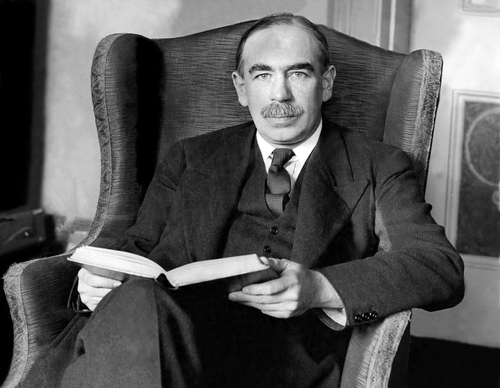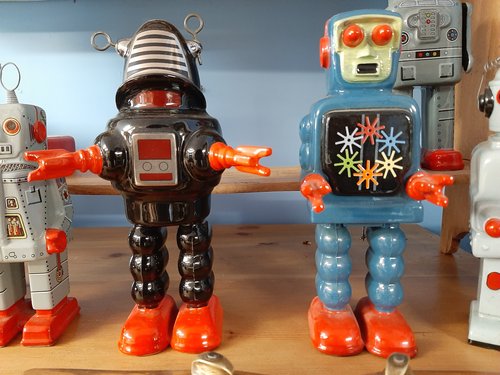A “Nouvelle Alliance” Between Economics And Engineering
Monday, 21 February 2022By Sergio Mariotti

Globalization and technological change have worked to give us an economy that is increasingly characterized by complexity, irreversibility and unpredictability. To unravel the tangle, economists have to improve and broaden their competencies.
John Maynard Keynes's opinions on the character of economists are more relevant today than ever:
“the master-economist must possess a rare combination of gifts. He must reach a high standard in several different directions and must combine talents not often found together. He must be mathematician, historian, statesman, philosopher-in some degree. He must understand symbols and speak in words. He must contemplate the particular in terms of the general, and touch abstract and concrete in the same flight of thought. He must study the present in the light of the past for the purposes of the future. No part of man's nature or his institutions must lie entirely outside his regard. He must be purposeful and disinterested in a simultaneous mood; as aloof and incorruptible as an artist, yet sometimes as near the earth as a politician”.[1]
Unfortunately we have fallen somewhat short of the mark according to Robert Skidelsky, the author of the award-winning biography of Keynes:
“no branch of human inquiry has cut itself off from the whole—and from the other social sciences—more than economics […] Economists claim to make precise what is vague, and are convinced that economics is superior to all other disciplines […] and view economic problems as essentially mathematical problems. The efficient state of the economy, general equilibrium, is a solution to a system of simultaneous equations. Deviations from equilibrium are ‘frictions’, mere ‘bumps in the road’; barring them, outcomes are predetermined and optimal. Unfortunately, the frictions that disrupt the machine’s smooth operation are human beings […] Today’s professional economists […] have studied almost nothing but economics. They don’t even read the classics of their own discipline. Economic history comes, if at all, from data sets. Philosophy, which could teach them about the limits of the economic method, is a closed book”.[2]
This “ivory tower syndrome” not only contrasts with Keynes’s view, but also with the desire of scientists for the integration of knowledge. Think of Ilya Prigogine who based his 1990s theory of complexity on the need for a “new alliance” between the natural and human sciences in order to restore a unified knowledge based on plurality, diversity and multiple perspectives.
How can we forge a new alliance between economics and the other human sciences in order to deal with complex problems? In Forging a new alliance between economics and engineering[3], I explore what this would mean if we focus on the two mentioned disciplines in the context of one complex problem: a future society increasingly influenced by the cluster of organizational and market innovations induced by Artificial Intelligence technologies.
Economists and engineers have played a vital role in the evolution of our modern society. The related disciplines have intertwined with each other, from the seminal contribution to the founding of modern microeconomics and general equilibrium theory by French and Italian engineers (Jules Dupuit, Vilfredo Pareto, Léon Walras, and others), to Nobel laureate Alvin Roth with his proposition on "economist as engineer".
However, since the early twentieth century, economics and engineering have become institutionalized, deepened, articulated and increasingly separated both professionally and academically. The two professions have never lost sight of each other but with growing separation and coolness, to the point of seeming even in conflict since the early twentieth century. Austrian economist Friedrich Hayek stated the problem in the simplest terms: “It is probably no exaggeration to say that to most people the engineer is the person who actually does things and the economist the odious individual who sits back in his armchair and explains why the well-meaning efforts of the former are frustrated”[4].

Now, the point is that today, Artificial Intelligence sheds light on the inadequacy of both the economics and engineering mainstreams and their relevant paradigms in dealing with, and responding to, the profound economic, ethical and social transformations that have brought humanity into a new ‘complexity era’.
Take the example of ‘algorithmic collusion’. The literature explains that an AI algorithm programmed for profit maximization is able to autonomously learn how to achieve the goal without any human intervention and discover new collusive pricing rules, previously unknown to humans. The main consequence is that, should algorithmic collusion emerge in a market, society lacks an effective defense to stop it. Indeed, firms are, or declare themselves, unaware of collusion, while AI does not have a mind, a will, or consciousness. Therefore, in the collusion between algorithms there can be no “meeting of minds”, on which the judgment and sanctioning of the antitrust authorities can be based.
To address the problem, it has been proposed that antitrust policy shifts its focus from communication (with humans) to rules of conduct (with algorithms). The rationale for the proposal is that, whilst human collusion leaves a breadcrumb trail of communications between firms, in algorithmic collusion, the collusive pricing rules developed by machines are hidden deep within evolving algorithms and are not accessible to human eyes. However, “making the proposed change operational involves a broad research program that requires the combined efforts of economists, computer scientists, and legal scholars”.[5]
So, how do mainstream economists and engineers view AI?
To traditional economists, AI seems to be a new bonanza as the behavior of AI agents, with no computational power limits, can be closely described by means of the analytical apparatus of marginalism. In this context, mainstream economists could exploit the strong impenetrability of the machina economica to reinforce the illusion that their prevailing ideology is an unassailable logic, that is to say, subjectivity-free like a ‘pure’ exact science.
On the other side, many engineers and computer scientists have been fascinated by this perspective:
With respect to academics: ‘the field of AI strives to build rational agents capable of perceiving the world around them and taking actions to advance specified goals. Put in another way, AI researchers aim to construct a synthetic homo economicus, the mythical perfectly rational agent of neoclassical economics. We review progress toward creating this new species of machine, machina economicus”.[6]
As for the profession, the top engineering schools are heavily involved in developing effective programs that produce smart, but incurious graduates, trained according to the economic mainstream, who are true believers in machina economica.
However, the reality of what is needed is very different. Looking at the potential of AI, we might find ourselves in a world of ‘smart machines in incredibly complex situations’, rather than of ‘very smart people in incredibly simple situations’, as supposed by neoclassical theory.

We can imagine a multi-agent world populated by a large number of AI machines that are designed, deployed, and operated by heterogeneous owners, i.e., parties with different and possibly misaligned utility functions; AI environments with new rules of interaction, which are a matter of both engineering and public policy; a strong power held by system designers who can program agents in any desired way but suffering from the possibility of AI’s autonomous discovering of new and not necessarily desired or socially acceptable behavioral rules, and so on.
In this scenario, a complexity approach is needed, focused on the interactions between individuals, institutions, and the evolving economy, and centered on homo complexicus, as opposed to machina economica.
In my paper, I conclude that what is required is a return to Prigogine’s ideas, specifically integration of complementary economic and engineering constructs, the protection of plurality, and the determination to understand and tackle possible tensions. I believe that the right form that the economics-engineering relationships should take on is an “alliance à la Prigogine” (not a merger…), according to which each discipline, with equal dignity, independence and mutual respect, agrees to be fertilised and transformed by the other, in a context of coexistence and continuous emerging of new theoretical and practical approaches.
A profound change in education is needed for economists, engineers (and other professionals) to effectively collaborate together:
- making room in economics and engineering curricula for more holistic learning linked to the distinctive features of transdisciplinarity (ie., attention to the human being and to society, practicing mindfulness, developing social responsibility, participatory learning, search for the unity of knowledge);
- scholars well rooted in their own discipline, who are open to tackling complex problems and who are less self-referential and do not abuse disciplinary formalism;
- effective bridges among universities and between these and other institutions to develop research programs open to variety, creativity, and participation of cooperative networks of scholars and practitioners;
- huge private and public funds that accept seemingly inefficient redundancies in funding large-scale and long-term social and scientific experiments, ie., patient funding that looks at the trade-off between lower short-term R&D (research and development) productivity and a greater likelihood of generating new radical knowledge.
The Journal of Industrial and Business Economics organized a symposium on these ideas, which was attended by historians, economists and engineers. The Journal published their comments[7] and my response (The economics-engineering nexus: response to the commentaries).[8]
For those who want to know more, I further explore some issues. In particular:
(i) the complex relationships between science (pure and social), engineering and economics, in order to clarify the epistemological and methodological convergences and divergences that have emerged over time between the disciplines
(ii) the alliance between economics and engineering as an alternative to the current forms of "disciplinary imperialism".
____________
Sergio Mariotti MSc is Professor Emeritus of Industrial Economics and Policy in the Department of Management, Economics and Industrial Engineering at Politecnico di Milano, in Milan, Italy. His research interests cover the economics of technology and innovation, and the economics of industrial and institutional change. His current research focuses on the economics-engineering nexus and the impact of artificial intelligence on markets and institutions.
[1] Keynes, J. M. (1924). Alfred Marshall, 1842-1924. The Economic Journal, 34(135): 311-372.
[2] Skidelsky, R. (2016). Economists versus the economy. Project Syndicate, December 23.
[3] Mariotti, S. (2021). Forging a new alliance between economics and engineering. Journal of Industrial and Business Economics, 48:551–572. Link: https://rdcu.be/cj3jV
[4] Hayek, F. (Ed.). (1935). Collectivist economic planning. Routledge and Kegan Paul.
[5] Calvano, E., Calzolari, G., Denicolò, V., Harrington, J. E., & Pastorello, S. (2020). Protecting consumers from collusive prices due to AI. Science, 370(6520), 1040–1042.
[6] Parkes, D. C., & Wellman, M. P. (2015). Economic reasoning and artificial intelligence. Science, 349(6245), 267–272.
[7] Journal of Industrial and Business Economics (2021), Volume 48, Issue 4.
[8] Mariotti, S. (2021), The economics–engineering nexus: response to the commentaries, Journal of Industrial and Business Economics, https://doi.org/10.1007/s40812-021-00203-z&: https://rdcu.be/cBwQe